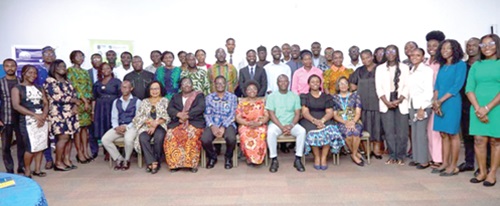Up to 65 per cent of adult Ghanaians are unable to afford a healthy diet daily.
The recommended healthy diets consist of half a plate of vegetables and fruit, a quarter of a plate of carbohydrates, and another quarter of protein.
Prof. Anna Lartey, a Professor of Nutrition at the University of Ghana, made this known at a sensitisation workshop in Accra, dubbed “Beyond the dialogues, Tracking Ghana’s Commitments to Transform its food systems”.
The workshop was organised by the University of Ghana School of Public Health, with support from the National Development Planning Commission (NDPC), the Ministry of Food and Agriculture, and the Ghana Statistical Services (GSS), as part of a project to track the country’s food systems transformation commitments adopted in 2021.
Healthy, junk foods
Prof. Lartey explained that healthy foods were more expensive than “junk” foods, which made people opt for them.
For example, she said, fruits and vegetables were far more expensive than the sugar-laced drinks and fast foods.
She explained that these unhealthy foods were common on almost every street corner, and, therefore, came in handy.
Unhealthy eating habits came with dire consequences, she further explained.
The academic said such unhealthy foods were a primary cause of the many non-communicable diseases (NCDs) and other ailments in the country.
She, therefore, advised people to make significant changes to their diets to help reduce preventable deaths.
Prof. Lartey said 15 million deaths worldwide could be prevented if society adopted healthy diets, and called for a transformational change in “our food systems”.
The renowned nutritionist encouraged people to take personal responsibility for their diet.
Food environment
According to Prof. Lartey, who is the Project Co-Principal Investigator, food systems were influenced by the environment, and today’s food environment did not enable healthy choices.
She added that “Ghana made a number of commitments in terms of how to address the country's food systems to make sure that it delivers on the health that we want.
So, this project is saying that we have held the dialogues, we have talked, now let us look at action.
What steps are we putting in place to ensure that the commitments we made are being achieved?”
The project’s Principal Investigator, Prof. Amos Laar of the University of Ghana’s School of Public Health, giving an overview of the project, said it was to track and monitor Ghana’s commitments.
He said the project aimed to use a science-based approach to track the implementation of the country’s commitments to transform its food systems.
He added that it also aimed at promoting the country’s food system and creating a safe food system environment.
Workshop
Over 160 United Nations Member States and representatives of regional blocs in 2021 committed to transforming their food systems by 2030 at the UN Food Systems Summit with the goal of ensuring sustainable, healthy diets for all.
Ghana, at the time, committed to 17 Food System transformation commitment goals by 2025, including increasing the percentage of early initiation of breastfeeding within one hour from 52 per cent in 2017 to 80 per cent, and increasing exclusive breastfeeding for six months from 42.9 per cent in 2017 to 62 per cent.
The workshop brought together stakeholders in the country’s food systems, such as civil society organisations, ministries, departments and agencies.
Writer’s email:rebecca.quaicoe-duho@graphic.com.gh


